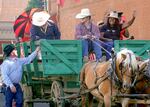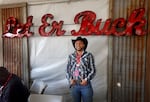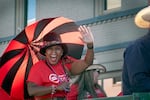
Urban League of Portland President and CEO Nkenge Harmon Johnson, right, waves at the crowd from a wagon during the Westward Ho! Parade in Pendleton, Ore., Sept. 15, 2023.
Antonio Sierra / OPB
James McKenzie was initially hesitant when the Urban League of Portland invited him to the Pendleton Round-Up.
The venerable nonprofit was planning its biggest Round-Up celebration, a culmination of six years of outreach and community building. But McKenzie, a member of the Urban League’s Young Professionals program, knew Eastern Oregon could be a lot different for a person of color than his home in Portland.
“(There was) a lot of anxiety and anticipation because once you go out of the bubble Portland, then you enter into more red areas within the state,” he said “It’s almost as if you pass this invisible Mason-Dixon Line past Hood River.”
Ultimately, McKenzie was swayed by the chance to dress like a cowboy for a few days. Within his first few hours at the rodeo, he scored a Pendleton Whisky belt buckle.
“It’s really incredible,” he said. “They’ve been doing this for a real long time. Just driving around the city finding parking I found (out) that everything shuts down for it. This is the event to do”
Founded in 1945, the Urban League focuses on providing advocacy and social services for Oregon’s Black communities. This year, the Urban League arrived in Pendleton 40-strong, the largest group the league has ever brought to the Round-Up. The organization aimed to give its members the full Round-Up experience: a day at the rodeo, a wagon in the non-mechanized Westward Ho! Parade and time to connect with people in Pendleton.
While much of the group she was with had never been to Round-Up or even a rodeo in general, Urban League President and CEO Nkenge Harmon Johnson said she started bringing the organization out to Pendleton as a way of “placemaking,” creating a space for Black Oregonians who otherwise might not feel comfortable at an event where most of the participants are white.
“They don’t feel safe to go by themselves,” she said. “Or they don’t feel comfortable taking their families for the first time, because of thoughts or concerns they have about what it means to be Black in Eastern Oregon. Or what it means to be Black, and to travel to some of our rural spaces. Completely understandable fears and concerns.”

Urban League member James McKenzie poses under a Let 'er Buck sign at the Pendleton Round-Up Arena, Sept. 14, 2023.
Antonio Sierra / OPB
Harmon Johnson said it was fine if Black visitors kept up their situational awareness in Pendleton, but the Round-Up was otherwise a welcoming place with a significant Indigenous presence.
Whether it was the actual sport of rodeo or the fashion in the stands, the Urban League visitors enjoyed the Round-Up on their own terms. This might have been best exemplified by director of development Nikki Paxton, who sported a steampunk top hat inspired by the 1999 film, “Wild Wild West.”
Margaret Carter, the first Black woman elected to Oregon’s legislature and a former Urban League president, hadn’t been to the Round-Up in many years but was already anticipating her next visit. She wanted to be up in the stands next time, rather than the field-level tent the League had rented out.
“I’m a rabble rouser when I come to things like this,” she said. “I want to be able to just really (cheer) people on and say ‘hang on’ to the guys that are riding the horses and things of that nature.”
Historical connections
Harmon Johnson said she knew she wanted to turn the Round-Up trip into a tradition when she saw the positive reaction of Black people at the event, visiting not just from Eastern Oregon but from all around the inland Northwest.
“That was really the impetus that drove me to say, ‘Oh no no, this isn’t a once-in-a-while thing that we do,’” she said. ‘We will do this every year because there are people here in the community who want to further connect with us and we want to connect with them.’”
The Pendleton Round-Up takes place in Umatilla County, where only 1% of the population is Black. Other counties in the region have a similar or smaller share of Black residents. But at a meeting the Urban League held after the Westward Ho! Parade on Friday, the group reminded a small audience that Eastern Oregon is rich in Black history.
Historians estimate one in four cowboys were Black during the early 20th Century, a fact reflected locally by George Fletcher, known as the “people’s champion” for his daring rides at the 1911 Round-Up. A few decades later, the all-Black 555th Parachute Infantry Battalion, known as the “Triple Nickles,” trained in Pendleton as smokejumpers during World War II. Further east, Black loggers helped make Maxville the largest town in Wallowa County in the 1920s and 30s before a logging company shut down its timber operation.
Black people in Eastern Oregon often had to endure rampant racism and discrimination during that time, but those experiences aren’t simply confined to history.
The Urban League spent part of the meeting honoring Jackie Linton, the first Black Hermiston city councilor.
Linton admitted that she hadn’t given the fact much thought before she won her seat. She still attempted to explain how a Black woman won a city council seat in a town that’s less than 1% Black.
Linton had grown up in Hermiston but moved away as an adult and didn’t return until after she retired. She began attending city council meetings as a member of the audience and eventually came to the conclusion that the councilor who represented her wasn’t voting in alignment with her ward’s working-class interests.
She ran against the incumbent in 2018 but fell short. Four years later, Linton said she took more time to campaign, explaining to voters why she was running and where she disagreed with the city council’s votes.
“I ended up winning because (voters) felt the same way,” she said.
It was a huge applause line for the Urban League members in the audience who were spending their last day in Pendleton before returning home the next day.

Urban League Director of Development Nikki Paxton waves to the crowd at the Westward Ho! Parade in Pendleton, Ore., Sept. 15, 2023
Antonio Sierra / OPB